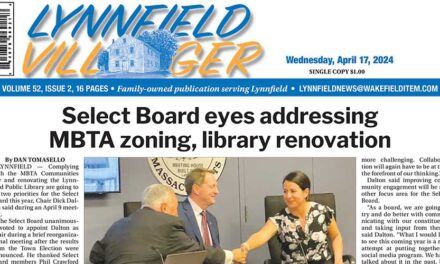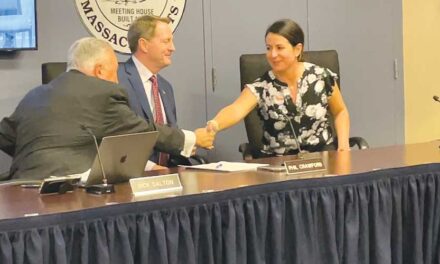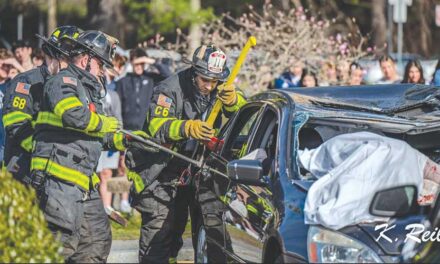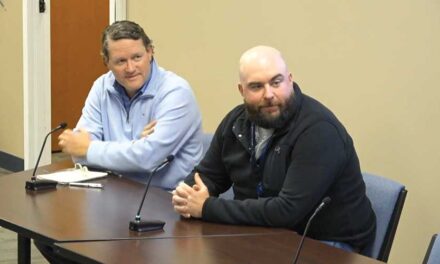Published October 31, 2018
By DAN TOMASELLO
LYNNFIELD — After months of enduring an onslaught of campaigning and relentless political advertisements, voters will finally make their voices heard when they head to the polls on Tuesday, Nov. 6.
Voters in all four precincts will be casting ballots in the Lynnfield High School gymnasium from 7 a.m. to 8 p.m.
In an interview with the Villager, Town Clerk Trudy Reid said she is expecting a high turnout for the state election.
“We had an 85 percent turnout in 2016,” said Reid. “Based on the requests for absentee ballots and the number of people voting early, I am predicting a 65 percent turnout.”
Reid said the high school will be closed on Election Day.
“Parking should be easier this time,” said Reid.
If residents are unable to vote on Election Day, townspeople will be able to request an absentee ballot. Election laws require that absentee ballots be available to registered voters who meet one of the following three criteria: Absent from the town during hours the polls are open; physical disability which would prevent voting at the polling place; and religious beliefs that would prevent participation on Election Day.
Reid said applications for absentee ballots must be completed and received by the Town Clerk’s Office by 12 p.m. on Monday, Nov. 5.
Early voting will be available to residents for the rest of the week. The deadline for early voting is Friday, Nov. 2 at 1 p.m.
Races
The state election features nine contested races.
In the race for governor, Republican Gov. Charlie Baker and Lt. Gov. Karyn Polito are facing off against Democratic challenger Jay Gonzalez and his running mate Quentin Palfrey.
There is a three-way race for U.S. Senate. Democratic incumbent Elizabeth Warren is running against Republican State Rep. Geoff Diehl of Whitman and independent Shiva Ayyadurai.
Two candidates are running for attorney general. Democratic incumbent Maura Healey is facing off against Republican James McMahon.
There is a three-way race for secretary of state. Democratic incumbent William Galvin is running against Republican Anthony Amore and Green-Rainbow Party candidate Juan G. Sanchez.
In the three-way race for state treasurer, Democratic incumbent Deborah Goldberg is facing off against Republican State Rep. Keiko Orrall of Lakeville and Green-Rainbow candidate Jamie Guerin of Northampton.
Four candidates are running for state auditor. Democratic incumbent Suzanne Bump is looking to hold onto her seat. Bump’s challengers are Republican Helen Brady, Libertarian candidate Daniel Fishman and Green-Rainbow candidate Edward Stamas.
Democratic Congressman Seth Moulton is facing off against Republican Joseph Schneider and independent Mary Jean Charbonneau.
Two candidates are running to represent the sixth district on the Governor’s Council. Lynnfield resident and Democratic incumbent Terrence Kennedy is being challenged by independent Vincent Dixon of Winchester.
There is a three-way race for Register of Deeds. Democratic incumbent John O’Brien Jr. is facing off against Republican Jonathan Ring and independent candidate David Colpitts.
Four candidates are running unopposed in the state election. State Rep. Brad Jones (R-North Reading) is running for re-election once again. State Sen. Brendan Crighton (D-Lynn) is running for a full two-year term. Crighton was elected to the seat formerly held by Lynn Mayor Tom McGee in March.
Jonathan Blodgett is running for Essex County District Attorney once again. Clerk of Courts Thomas H. Driscoll Jr. is running for re-election.
Ballot questions
In addition to the candidates running for office, townspeople will be voting on three ballot questions.
The most hotly contested ballot question is Question 1, which would limit how many patients could be assigned to each registered nurse in Massachusetts hospitals and certain other health care facilities. A yes vote would limit the number of patients that could be assigned to one registered nurse in hospitals and other health care facilities. A no vote would make no change in state law.
Question 2 would establish a commission that would be tasked with considering and recommending potential amendments to the United States Constitution in order to “establish that corporations do not have the same constitutional rights as human beings.” A yes vote would create the citizens commission to advance an amendment to the United States Constitution to limit the influence of money in elections and establish that corporations do not have the same rights as people. A no vote would not create the commission.
Question 3 would add, “Gender identity to the list of prohibited grounds for discrimination in places of public accommodation, resort or amusement.” A yes vote would keep the current law and a no vote would repeal the law.




